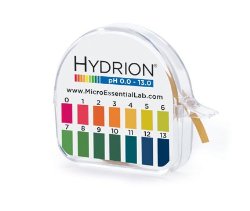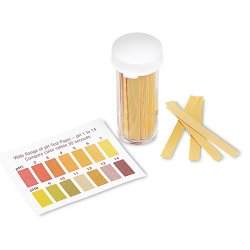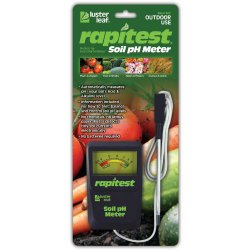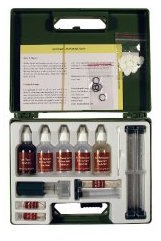Three Easy Soil pH Test Methods
Why do a Soil pH Test on your garden soil? Your soil's pH can have a profound affect on what nutrients are available to your plants.
This is especially important for those of your using synthetic fertilizers to feed your crops. If you are already using compost and working with your soil's biology you might find the pH of your soil is adjusting to perfection without you.
So the ph tests are either vital or just plain interesting and fun...
Soil pH testing is done to see how acidic or alkaline your soil is. pH means potential Hydrogen. It measures the number of H+ ions in the soil water.
It's a logarithmic scale that goes from 0 to 14. A pH of 7 is considered neutral and most plants prefer something around 7 or just a little lower or acidic. Anything under 7 is acidic with 0 being with 0 being most acidic, 7 being neutral and 14 being most alkaline. Because it's a logarithmic scale each jump is a ten fold increase so a soil with a pH of 5 is 10 times more acidic than one with a pH of 6 and a 100 times more acidic than one with a pH of 7.
Acidic or Alkaline?
You can of course send a sample of your soil to a lab for a pH test but then you couldn't pretend to be a scientist or a CSI.
Here is a quick and simple way to test if your soil is acidic or alkaline.You'll need your soil, some vinegar, distilled water, and baking powder.
- Take a small handful of soil and rub your hands with it. This will clean off anything on your hands that might affect the soil.
- Take another clean handful of soil. Wet the soil with vinegar. If it fizzes and bubbles you have alkaline soil.
- Take another clean handful of soil. Add baking powder and then wet the soil baking powder mix with distilled water. If it fizzes your soil is acidic.
Now you have a bit of info and you probably want to know how acidic or alkaline your soil is.
pH Soil Test with pH Paper
When I first looked at soil pH test options I figured you had to buy a soil pH test kit to test soil. However I have since discovered that a whole range of pH test strips including those for urine and saliva, for aquariums, and for water should be just dandy for testing soil. Here are a couple of examples of test strips and rolls of pH paper that would be suitable and are available from Amazon.
 |
 |
|
|
|
When you look for pH test strips you need to notice the pH range they test. Many strip or rolls of test paper say they are universal and test from pH 1 to 14. This would be fine. Some however test a smaller range. Ideally you want test paper that includes pH from 4.5 to 10 for soil testing.
To use the test strips:
- Rub your hands with a small handful of soil to clean off anything on your hands that might affect the soil.
- Take a small handful of soil and wet it thoroughly with distilled water. You could also use a plastic lid to mix the soil with distilled water.
- Touch the test strip to the water and soil mixture and wait for the color to change.
- Compare the color to the color chart that comes with strips. Take the reading from the area that is closer to the soil rather than further away where the water wicks up to.
Here is a video with a detailed closeup of someone doing a pH test using pH test strips. It starts off with the gentleman shaking a soil water slurry. This slurry is made with equal volumes of soil and water. When measuring your soil don't include rocks or vegetation.
Use a Soil pH Meter
Here is a possible pH meter and a soil testing kit. There are a number of suitable choices available through Amazon.
 |
 |
To use a pH meter you simply plunge the rod into the damp soil and a needle will jump to the approximate pH reading for your soil. It takes about a minute. Make sure the soil is damp or you will not get a reading.
What I like about the meter is you can take a lot of readings with the only expense once you have the meter being your time. You may want to add some of the text strips so you can check to be sure your meter is accurate.
What might you want to check? See what the difference is in
- the root zone of your crops,
- in the root zone of some weeds,
- in the root zone of your lawn,
- where you used compost
- where you have bare soil
The second way is with indicator agents. Your kit will come with detailed instructions. The one pictured above can do 20 pH tests but is also good for testing NPK - Nitrogen, Phosphorus and Potassium.
The most important thing is to use distilled water for everything you need to wet as your tap water may skew your results. The process of doing these kinds of tests for your soil is very fun and one you can share with your kids. Even those not too crazy about science will like the process.
What's next...
If you missed our Soil pH Primer check it out. Here you'll find details on how soil pH affects plants.